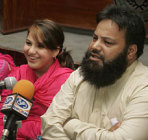 Molly’s case holds lessons for us all
Molly’s case holds lessons for us all
By Sarfraz Manzoor
Guardian, 4 September 2006
When the news first broke that a 13 year old girl called Molly Campbell – also known as Misbah Iram Ahmed Rana – had been “abducted” by her Pakistani father and taken to Lahore the media appeared certain what kind of story this was: a vulnerable Asian girl is plucked from her Scottish home and forced into an arranged marriage.
The Independent quoted Molly’s grandmother claiming the schoolgirl had been taken to Pakistan and forced to marry a 25 year old man. Meanwhile, in the Times, Mary Ann Sieghart was bemoaning how “even the Outer Hebrides failed to provide sanctuary for Molly Campbell against a father determined to take her off to Pakistan”. Fellow columnist Camilla Cavendish waded in, noting that Molly’s “abduction” raises “fundamental issues of equality that cannot be swept under the carpet to protect ‘cultural sensitivities’.”
Cavendish was right that the alleged abduction raised fundamental issues, but wrong about everything else. On Friday afternoon Molly appeared on television with her father to announce she had left Scotland of her own free will and that she wanted to stay in Pakistan because she wanted to remain with her father. When the reporters continued referring to her as Molly she told them: “My name isn’t Molly, it’s Misbah.”
What I find particularly powerful about the case of Molly/Misbah is that it illustrates the dangers of racial profiling as practised by some of the media. No sooner had the story emerged than the news editors were preparing special reports on abductions and child brides, and the white middle-class columnists were busy revealing their lack of insight.
Misbah’s Pakistani father was found guilty before anyone had bothered to speak to him. In their rush to condemn – with its echoes of the treatment given to the Forest Gate brothers earlier in the year – the media exquisitely demonstrated why they need to embrace diversity. Not for any politically correct desire for fairness but, as Sunny Hundal wrote in MediaGuardian only last week, because it might result in better journalism.
The white journalists clearly could not comprehend the possibility that a girl whom they were determined to call Molly might want to go to Pakistan, and might in fact prefer it to the Outer Hebrides.
Why was Molly’s mother’s side believed without question? Because it confirmed stereotypes held by many about the experience of Muslim girls in this country. A BBC news executive has admitted to me that the organisation could have handled the story better. “We have learnt a lot from this episode about how to cover cultural differences and family affairs,” he told me. I fervently hope that the rest of the media look hard at their prejudices and try to learn some of the lessons from Misbah’s story.
